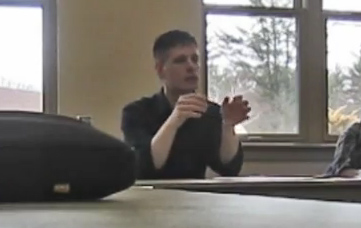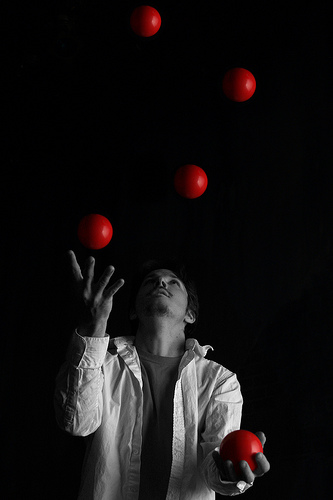I’m not much of a fan of sitcoms, but here’s the voice over introduction to one that’s not only dang amusing, but also a surprisingly good course in habit change:
You know the kinda guy who does nothing but bad things and then wonders why his life sucks? Well, that was me. Every time something good happened to me, something bad was always waiting around the corner. Karma. That’s when I realized I had to change. So I made a list of everything bad I’ve ever done, and one by one I’m gonna make up for all my mistakes. I’m just trying to be a better person. My name is Earl.
I’ve enjoyed watching episodes of Earl via Netflix for a year or so, but it wasn’t until this morning, reading Charles Duhigg’s excellent book The Power of Habit, that I realized that Earl’s method of changing his life is a near-perfect model of real habit change, as supported by reams of research, a few superbowl championships, millions of now-sober alcoholics, and much other evidence.
Just trying to be a better person
Earl, played with innocence and a blind, cheerful, openness to whatever may come by Jason Lee, used to be a small-time criminal, stealing whatever he could, however he could–the dumber the idea, the better. In the series, he now spends his time hunting down people he’s hurt and trouble he’s caused, one item at a time, and making up for all those past mistakes. Compare this to Duhigg’s depiction of habit change, which has two main components: replacing the routine and cultivating belief.
Changing a habit by substituting a new routine
Habits, as Duhigg describes them, have three parts: a cue, a routine, and a reward. For example, the cue might be boredom; the routine, eating a bag of potato chips; and the reward, the physical pleasure of eating the chips.
Earl’s cue was anything that might get him some easy money or swag; his routine was committing the crime in whatever hare-brained way immediately came to mind; and his reward (when he got one) was acquiring some new stuff on his supposed path to the good life.
In present of the series, though, that’s all old news. Earl’s new cues are pretty much the same as his old ones: he hatches an idea or stumbles across a situation that provides an opportunity, but now it’s an opportunity to make up for something bad he’s done rather than a potential crime. He still uses whatever hare-brained approach leaps to mind to get the job done, but the core of the routine is different: instead of petty theft, it’s making up for wrongdoing. The reward is similar: he doesn’t get any physical wealth, but he counts his riches in karma now, and his satisfaction and pleasure at crossing off an item from his list is palpable, not to mention very similar to the satisfaction we see in flashback scenes of him successfully getting away with crime.
That’s the way to change a habit, says Duhigg: keep the cues and the rewards the same, but change the routine. Actually, I would suggest that should be amended to keeping the cues the same, change the routine, and allow for a modestly different reward: drinking a cup of tea doesn’t give the exact same payoff as smoking a cigarette, for instance, but the rewards are surprisingly similar.
You gotta believe!
It would be handy if changing habits were as simple as identifying cues and rewards and finding a new routine to sandwich in the middle, and in fact this seems to be a central part of habit change–but, as Duhigg points out, this isn’t enough. You have to believe. I’ll write about this more in separate posts, but this belief component has been identified as a key force in the psychological literature. In order to really change, we have to have a powerful faith that what we’re doing can–maybe even must–be done.
Earl exemplifies this through his faith in karma, which he pictures as a simplistic, tit-for-tat force that automatically responds to any good or bad deed with good or bad fortune somewhere in the space of the 22-minute episode. Since this is a sitcom, karma actually works that way in Earl’s world, which means that when Earl’s starves himself and his brother, runs out of gas, and has to walk miles and miles to dance with Too-Tall Maggy (whom he spurned in the 8th grade), by the end of the episode he has been amply rewarded and is back drinking cheap beer with no cigarette butts in it. This convenient help from the universe makes it easy for Earl to believe, and is the one place where Earl’s life change is very different from real world changes, even though both require belief to get through the trying times. Our belief doesn’t come as easily as Earl’s, and it can be difficult and sometimes impossible to maintain on our own without special circumstances.
How to believe without magical instant karma
So how do we come to believe powerfully enough that even when our efforts seem nearly pointless, we can soldier on? In real life, belief comes in two main forms: tragedies and groups. As I say, this subject will be worth a good bit of further discussion, but the short version is that most of us only really change when something earth-shaking happens in our lives or in the lives of people close to us, or else when we become part of a group that makes the possibility change seem real. This is why a person can sometimes quit drinking after a DUI incident or after joining AA, but often can’t when just trying to push through alone. Note that even the disaster approach may only provide enough belief to get started: durable belief often depends on having a group of people in our lives to permanently change our point of view.
Earl, by contrast, spends his time with the exact same group of unprincipled, dim-witted friends and associates who urged him on to crime in a former chapter of his life–but his remedial, absolute faith in karma carries him through beautifully.
Like Earl, many of us are just trying to be better people. As far as I’m concerned, we’re lucky to have people like Earl (and Charles Duhigg, and AA founder Bill Wilson, and others) to show us the way.










